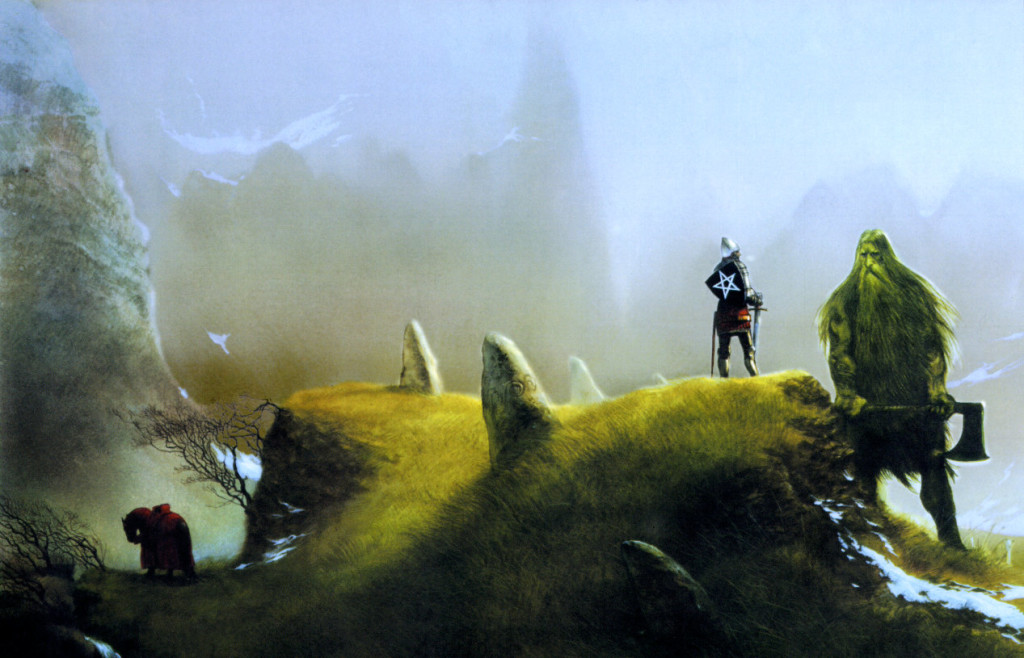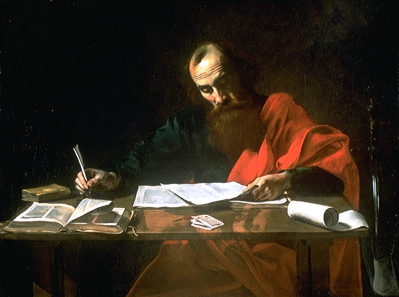You may want to read Part 2 before you read this.
Christianity requires a boatload of imaginative faculties, quite frankly!
We can imagine that most concepts in life require some understanding and some means by which to store them in our brain. Memories aren’t translated into a 1:1 correlation from our experience to our brains, so there’s always some imaginative faculty placing a particular emotion on our past events, for good or ill. Much of our lives requires a particular imaginative faculty to function, whether representational (as Augustine would have it) or even in creative works of any kind (such as this here writing gig). All of them require a working, functional brain that takes previously established things and combines them, reconfigures them, and arranges them in new ways with different permutations specific to that human being.
In a word, our imagination make us unique. We may look similar to other people, or even do similar things to people of the past, but the way we go about life also shows our imaginative faculties, their use, and (most importantly) their effectiveness. Thinking “outside the box” or “beyond the pale” requires a sturdy imagination with a capacity for wonder, insight, quick thinking, and a boatload of ideas and images to draw from. It cannot purely exist in the realm of the rational and logical; art and creativity aren’t decided by our ability to think according to man-made constructs, however useful they can become with enough investment.

What answers does the Bible provide? Right at the beginning, we know in Genesis that God creates. And, furthermore, we know that God created us in His image – and that we also create (or “subcreate, as Tolkien would call it) from the images we see.
6 Then God said, “Let Us make man in Our image, according to Our likeness; and let them rule over the fish of the sea and over the birds of the sky and over the cattle and over all the earth, and over every creeping thing that creeps on the earth.” 27 God created man in His own image, in the image of God He created him; male and female He created them.
So, we might ask, for what purpose would God make us in His image, first, and second, why we create out of necessity or pleasure (i.e., re-creation)? Because to create makes us more like God. Though our creative faculties seem limited by comparison, imagination allows us to craft worlds of infinite size, space, and dimension. We are only limited by our mind’s ability to comprehend reality, and for us this does not appear a restriction at all. A human thinks in human terms, and beyond that we cannot say, so functionally speaking human imagination is unlimited perceptually. Of course, we can abuse and refuse to use that gift given to us, mostly for ill, but the whole course of human civilization relied on imagination to exist. We can reach for the stars from our bedrooms, and a mighty fine gift it is.

From birth, we show a fascination with the so-called “make-believe”. Kids fight dragons and giants, embark on adventures, and challenge themselves in created worlds all the time – not at all dissimilar to video games (the main focus of this blog, in fact!). We tell our children those tales because, well, they want to hear them. They know the world is a scary place if one is alone, and I certainly know that from human experience – were we all not children once? Children know the evil and ugly in the world already; fairy tales aren’t their origin, but the reinforcement of a particular, peculiar idea: not the instilled fear of the boogeyman, but the possibility of evil’s defeat. Chesterton knows this well:
Exactly what the fairy tale does is this: it accustoms him for a series of clear pictures to the idea that these limitless terrors had a limit, that these shapeless enemies have enemies in the knights of God, that there is something in the universe more mystical than darkness, and stronger than strong fear…At the four corners of a child’s bed stand Perseus and Roland, Sigurd and St. George. If you withdraw the guard of heroes you are not making him rational; you are only leaving him to fight the devils alone. For the devils, alas, we have always believed in. The hopeful element in the universe has in modern times continually been denied and reasserted; but the hopeless element has never for a moment been denied.
We cannot deny that the Christian faith gives us hope that evil isn’t just defeated, but in a spiral of its own inevitable consequences. These things, too, shall pass, and we shall know it clearly and distinctly. Have you ever read the striking, disturbing, and often confusing imagery of Revelation, or the mysterious (possibly symbolic, but who could be sure) writings of the Prophets describing their visions? And yet, in all of those writings, to remain on God’s side will right the wrong, slay the evil doer, and bring things back to the natural sense of right and wrong we often feel, yet never speak aloud for fear of ridicule. Common sense is common sense, but not in our culture, of course.
Imagination gives us not just a sense of freedom, but the ability to think freely. That, I feel, is the most important part. Without such a creative faculty, and I assure you the world at large does not want you to think much less imagine anything outside its own cultural box, you inherit accepted doctrines and believe them as you own. You do not imagine things in different ways, because other people, not God, beat them into you as a child, into school, college, and adulthood. The breadth of how many of our most treasured beliefs come from others staggers the mind. But, at any time, you can break the spell and think: what if things were different?

This is where Christianity comes into the picture, with its renewing of the mind. It’s not a staid and tired dogma, but a doctrine of unlimited freedom. We rely on Scripture to open our consciousness to the vast, unlimited possibilities. Otherwise, we’re swamped in a sea of entertainment, of passivity, and distractions (again, speaking of which video games). We pay other people to tell us what to do, to think for us, and that is not the Christian life at all. Imagination and reason fit together in a happy harmony, but we must work for it. We cannot just accept it as a given, but build it up.
A great deal is said in these days about the value or valuelessness of logic. In the main, indeed, logic is not a productive tool so much as a weapon of defence. A man building up an intellectual system has to build like Nehemiah, with the sword in one hand and the trowel in the other. The imagination, the constructive quality, is the trowel, and argument is the sword. A wide experience of actual intellectual affairs will lead most people to the conclusion that logic is mainly valuable as a weapon wherewith to exterminate logicians.
Even so, we still need rationality. We need reason for imagination to work properly. We need an imaginative use of reason, and a reasonable use of imagination. Without direction, what do you get with imagination? A pile of vagaries, not creation. Remember God’s creative faculty chose and created things in specific. An unclear imagination does not produce much of anything; a pinpointed, specific imagination uses reason as a tool and an aid, not a problem. In other words, set a target and hit it; don’t let the distractions get to you. Our Internet, ADD-addled minds could use it.
Imagination is a thing of clear images, and the more a thing becomes vague the less imaginative it is. Similarly, the more a thing becomes wild and lawless the less imaginative it is.
And isn’t that interesting that the wildest and freest thing demands a law for effectiveness? Imagine any piece of modern art (of any medium, really) and you get the idea: when there’s no rules, there’s no distinction, and no wildness. If everything’s artistic, then what is art? Nothing’s amazing or unsettling or wonderful. How can I see wonder if everything’s wonderful?
The function of imagination is not to make strange things settled, so much as to make settled things strange; not so much to make wonders facts as to make facts wonders.
The imagination unsettles, thinks, feels, moves, and reasons through all of human life and finds that human life is really quite strange and wonderful. God made a most unbelievable place, and He chose to make us a part of it. We can be struck by its beauty, its utter weirdness, and see the world as God’s creative imagination come real, or become insular egoists who only see ourselves. The poet reaches to the heavens, while the logician goes mad.
We needed imagination, and God created us for it.
